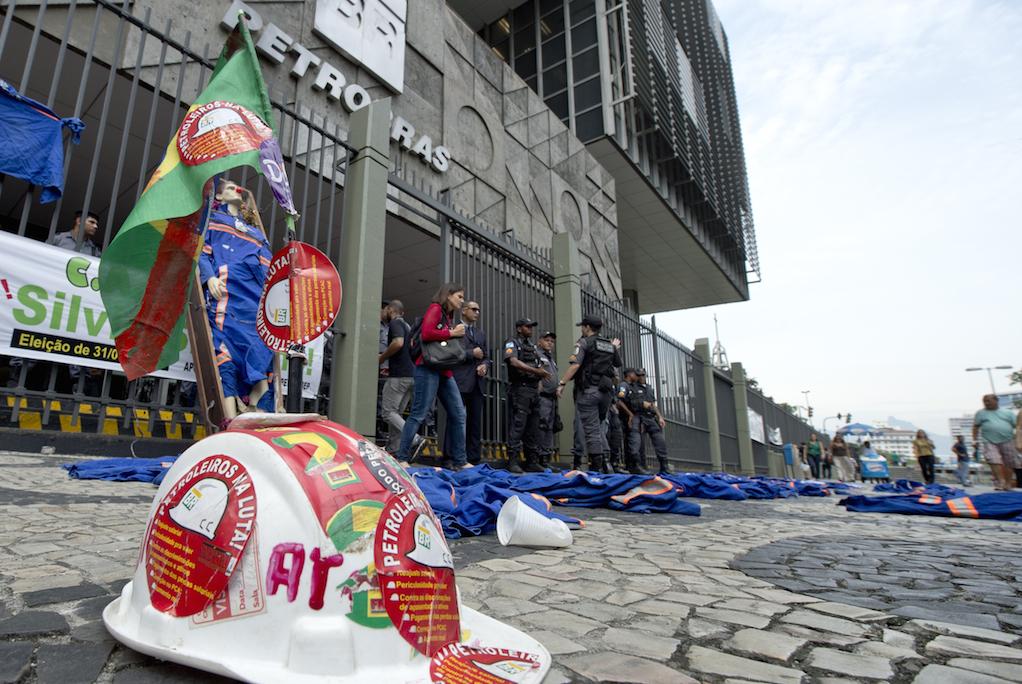3 big takeaways from the shakeup at Brazil’s Petrobras oil company
A safety helmet and overalls left by protesting workers from a company under contract for the Brazilian oil company Petrobras.
Update: On Friday, Brazilian oil company Petrobras named its new CEO: career banker Aldemir Bendine. Meanwhile, the scandal continued to widen.
MONTEVIDEO, Uruguay — The big news out of Brazil on Wednesday was that the CEO and five other top executives resigned from the beleaguered national oil company, Petrobras.
If that seems ho-hum — it’s not.
The resignations came during a growing scandal that threatens to engulf South America’s largest corporation. The scandal has so far led to criminal charges against dozens of current and former employees of the company and has ensnared top executives at large construction companies that contracted with Petrobras.
Prosecutors claim that former executives of the oil company worked with construction firm representatives to skim billions of dollars from contracts, much of which was then allegedly funneled to Petrobras executives, vendors and politicians, including members of the ruling Workers Party. The criminal case against Petrobras, along with serious concerns about the state of its accounts, have led to a collapse in the company’s stock price.
Here are three big takeaways from the news:
1. Petrobras shares are up, for the first time in a while
The Petrobras scandal couldn’t really have come at a worse time for Brazil, which officially entered a recession last August.
Since the prosecution announced its first arrest last March, the company’s shares have dropped to record lows and, on Jan. 29, the ratings agency Moody’s lowered its credit rating to the cusp of junk status.
The scandal has contributed to a slide in Brazil’s currency, the real, which fell to a nine-year low in December.
But Wednesday’s resignations proved a shot in the arm for the company. Rumors about them reported in local media on Tuesday sent Petrobras stock soaring more than 15 percent that day. On Wednesday the company’s stock rose again slightly.
The increase in stock price was a ray of hope for the company, but it has plenty more to be gloomy about.
2. Good luck finding a replacement CEO
It’s hard to overstate what a big deal the Petrobras scandal is in Brazil.
It’s the latest in a series of watershed corruption cases that have ensnared Brazil’s ruling elite. As GlobalPost noted in November, the recent slew of actions suggest Brazil’s rich and powerful could be losing their long-held impunity.
As a company, analysts say, Petrobras is currently pretty toxic. Along with the kickback scandal, it has also failed to adequately report its earnings or quantify the scandal’s impact by fessing up to how much was stolen.
That led the Financial Times to ask if anyone would be willing to take the job of outgoing CEO Maria das Gracas Foster. Here’s what the FT wrote:
“After all, Petrobras is now effectively cut off from capital markets and is facing technical default for breaking the terms of its existing debt after its auditors PwC refused to approve its accounts in November. Last week it calculated that its assets had been inflated by almost $23bn but refused to take an official writedown as it said it was not clear how much of this was down to corruption. As a result, both Fitch and Moody’s have downgraded Petrobras over the past few days to the lowest investment grade and threatened further action.
To make things worse, the company is also under investigation by the Securities and Exchange Commission in the US over the scandal.
For a headstrong executive looking to play the role of knight in shining armour, perhaps all this would not be a turn-off. But it is not yet clear just where this scandal will lead or whether the new chief executive may even find him/herself liable at some point, either in Brazil or in the US.”
There are a few rumors about replacements for Gracas Foster, and the company’s board will meet on Friday to try to name new executives.
3. Petrobras’ poison touch
Gracas Foster was something of a dream CEO for Brazil, a country still struggling to bring tens of millions of citizens out of poverty. She grew up in a “favela,” or poor neighborhood, in Rio de Janeiro, and reportedly gathered trash for recycling to make money as a child.
She has steadfastly denied any involvement in the kickback scandal, and there’s no indication from prosecutors she was involved.
Turns out, that doesn’t really matter.
As the company’s head, Gracas Foster has been ceremoniously lopped off, as have her top lieutenants.
What will be interesting to watch now is how far the Petrobras poison will spread. After all, President Dilma Rousseff herself chaired Petrobras’ board from 2003 to 2010, right when the kickbacks were allegedly taking place.
And Rousseff’s Workers Party was allegedly the recipient of billions of dollars skimmed from the company. As Petrobras employees and other top executives start to fall, members of the ruling party will likely be brought down with them.
And this scandal, known locally as “Lava Jato” (Car Wash), could be dragging extensive numbers of employers down with it even as the country’s economy sputters. More than 200 companies are on the police’s investigation list, The Globe and Mail has reported, and 86 people have so far been charged.
Every day, reporters and producers at The World are hard at work bringing you human-centered news from across the globe. But we can’t do it without you. We need your support to ensure we can continue this work for another year.
Make a gift today, and you’ll help us unlock a matching gift of $67,000!
